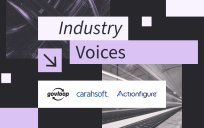Last week, GovLoop, Accenture and Pegasystems hosted an online training on the future of digital government. And an especially important part of that training was the Q & A session between panelists and attendees, since it provided a live, interactive forum for the exchange of ideas and solutions.
You can listen to an archived recording of the session in its entirety here. We’ve also highlighted some of the top questions and answers from the event.
Q: How do we change the culture in our agencies so that we’re open to going digital?
“The first thing is to understand the business of your agency,” said Lisa Schlosser, Deputy Associate Administrator at the Office of Management and Budget’s Office of E-Government and Information Technology. “Identify where the pain points are in the agency, and figure out where digital, IT or technology can help solve those problems.”
Schlosser also recommended taking a small piece of the problem you’ve found, and then piloting a solution to demonstrate that taking a new approach can product results. “There will be somebody out there – some sponsor in your agency – who will take that idea and scale it with you,” said Schlosser.
Q: How do you make the transition from legacy systems to more modern solutions?
“You have to build on top of [legacy systems],” said Thom Rubel, Business Line Leader at Pega. “You don’t throw it out.” Rubel advised investing smartly so that you’ve created a platform that allows the integration between the old and the new. This platform must be focused on the intent of the agency: What does the customer want, and what does the government employee need to get that information? Once you’ve done that, said Rubel, you’ve successfully transformed your existing infrastructure into one that is flexible and scalable.
Q: How do you make technology improvements in cases of limited budgets? Any tips on getting budget for these issues?
“First of all, you have to use your legacy assets,” reiterated Rubel. “But also be bold with your investments, and by being bold that means taking new approaches, being innovative, and focusing on the customer.” Rubel argued that it was not so difficult to make the budget case when you are focusing on outcomes, especially when you are using existing assets to get to those outcomes.
[State and Local Focus]
Q: How do we participate in the open data movement if we are serving a region in which there is less interconnectivity? How can we show our rural constituents that this information has value?
This question came from an attendee serving a predominantly rural region in which there was limited broadband access. Schlosser recommended hosting a hackathon or a datapalooza to put the challenge out there to developers or entrepreneurs to take on the task for you.
The second part is that Schlosser recommended looking for grants, from site like grants.gov, to help build that broadband capability in the community.
This is just a small sample of the great advice offered by last week’s panelists. In addition to these tips, attendees learned about:
- The benefits of adopting a case management approach to government
- The federal government’s digital strategy
- Open data facts
- New technologies that are powering tomorrow’s digital government strategies
You can listen to a recording of the event in its entirety here.
Additional Resources
- Pega Report: Using Pega for Agile Government
- Pega Report: Why Government Technology Projects Fail
- Pega for Government: Delivering on the Digital Strategy — Key Challenges
- Accenture Report: Build it and They Will Come?
- Accenture Federal: Why Federal Agencies Need Strategic Government Efficiency
Event Sponsored by:
 |
 |



Leave a Reply
You must be logged in to post a comment.